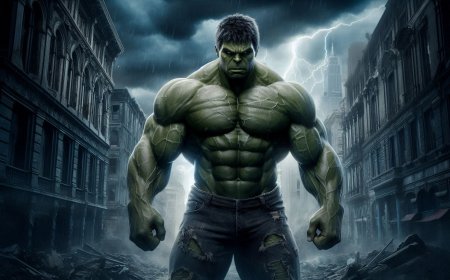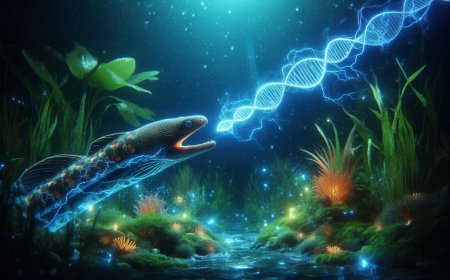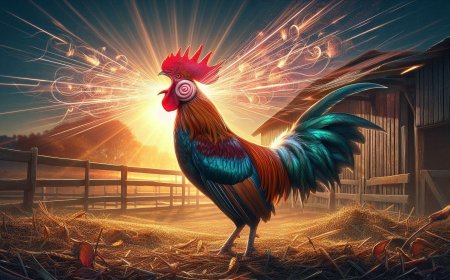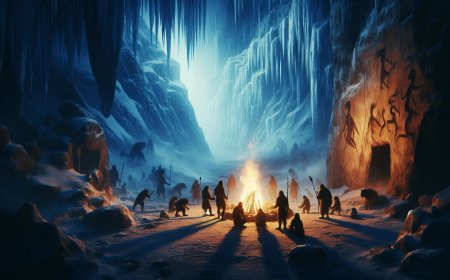The Whisper of Time
Explore the cosmic connection between Earth, the Moon, and time in The Whisper of Time, a tranquil scene of a child and their grandfather on a beach at sunset, symbolizing the slow passage of time and the gravitational dance shaping life.
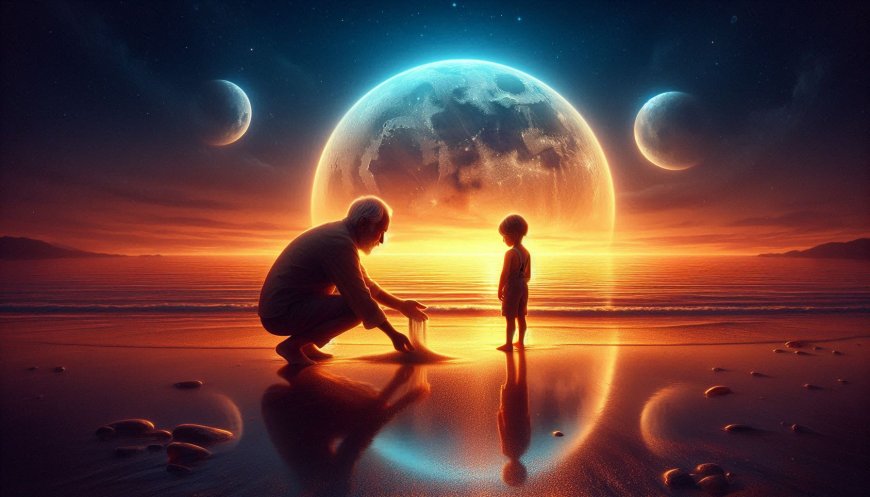
In the beginning, the Earth spun with the wild energy of youth, its days a quicksilver rush from dawn to dusk. The Sun arched across the sky in what seemed like the blink of an eye, and the world below hummed in harmony with this rapid rhythm. But time, as always, had other plans.
Millennia passed, unnoticed by most. Deep beneath the oceans, the Moon watched quietly, its ancient gaze fixed on the Earth. It pulled gently, subtly, drawing the waters toward itself, creating waves that whispered secrets to the shore. These whispers carried a hidden force, a gravitational dance that few knew was unfolding. Tidal friction—the invisible grip that the Moon had on Earth—began to tug at the very fabric of time.
For every wave that washed against the coast, a minuscule part of Earth’s momentum was stolen away. The once-young planet, still vibrant and alive, began to slow its spin. The days, once swift, started stretching ever so slightly, like a runner who tires after an endless race. The change was so small that no one could feel it, but it was there, growing. It wasn’t the kind of thing that people noticed during their brief lives, but the rocks and the seas remembered.
In the distant future, perhaps a thousand generations from now, a child stood on a beach at sunset. The horizon blazed with the warm hues of twilight, and the sea glowed under the light of a full Moon. The days were noticeably longer now—by just a fraction, but enough to leave its mark on the world. The child didn’t know the science behind it, but they felt something ancient in the air, as if the world itself had taken a breath between the waves.
“Why are the days so long now?” they asked, staring at the shimmering line where the ocean met the sky.
Their grandfather, a man who had grown up learning the stories of the stars and tides, smiled softly. “The Earth is slowing down,” he said. “The Moon, our companion in the sky, pulls at the oceans, and that pull makes our world spin just a little slower every year.”
The child frowned, looking from the sky to the sand between their toes. “So... will the Earth stop spinning one day?”
“No, not in our lifetimes,” the grandfather reassured, his voice calm like the waves. “Not for many millions of years. But the days will keep growing longer. People like us will need to keep adjusting our clocks. Someday, a day might be as long as two are now.”
The child’s eyes grew wide with wonder. “What will happen to everything? The animals, the plants?”
“Some will change with it,” the grandfather said, kneeling down to gather a handful of sand, letting it slip through his fingers like the ticking of a cosmic clock. “Longer days mean different seasons, new rhythms for life. The animals that wake with the Sun, the trees that follow its light—all of them will adapt, just as they’ve done before.”
He pointed to the Moon, glowing brighter now as the Sun sank lower. “That’s where it all starts. The Moon tugs at our oceans, slows our days, and shapes our lives. It’s a reminder that we’re connected to the heavens in ways we can’t always see.”
The child nodded, still deep in thought. The Moon seemed larger now, and for the first time, they felt a strange sense of time itself stretching, like the tide that had pulled away from their feet.
The slowing of Earth’s rotation would continue long after both the child and their grandfather were mere echoes in history. The Earth, too, would evolve, with longer days changing the winds and weather, the migration patterns of birds, and the bloom of flowers. Life would adapt, as it always had. The rhythm of the Earth, though slower, would still beat strong, a pulse in time shaped by the Moon’s gentle but unrelenting grasp.
This great celestial dance—a silent, invisible force—would carry on, through the rise and fall of civilizations, through epochs where humans were mere whispers in the wind. Earth’s future children, perhaps living in cities of glass under skies filled with stars, would still look up and wonder at the Moon, marveling at the quiet partnership that had stretched their days into long, golden hours.
And as the planet spun, just a little more slowly each year, it would be a testament to the delicate balance of forces that had shaped life itself—a reminder that time, like the Earth, is ever-changing, yet eternal in its quiet, graceful march.
What's Your Reaction?







